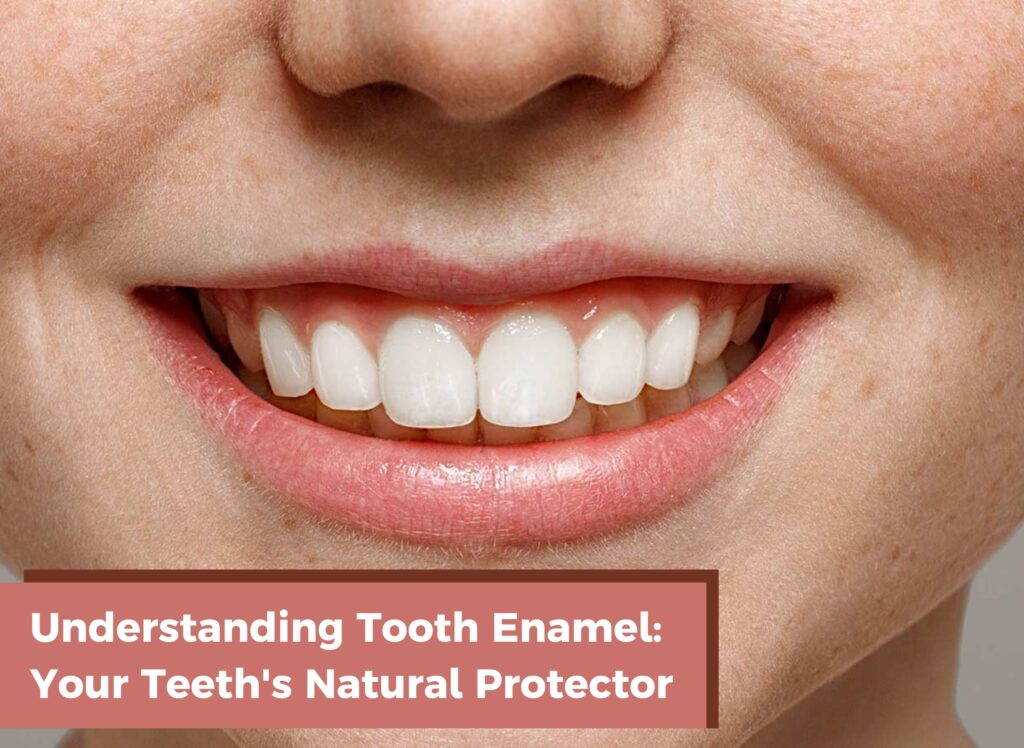Tooth enamel is a remarkable substance that serves as the first line of defense for your teeth. It is a strong, mineralized outer layer that shields your teeth from decay, sensitivity, and damage. At Thind Dental Clinic in Ludhiana, we prioritize educating our patients about the importance of tooth enamel and how to maintain its health. In this comprehensive guide, we will delve deeper into the structure and function of tooth enamel, common factors that can damage it, and practical tips to keep your enamel strong and healthy.
1. The Structure and Composition of Tooth Enamel
Tooth enamel is the hardest tissue in the human body, covering the crown of each tooth. It is primarily made up of hydroxyapatite, a crystalline form of calcium phosphate, which provides its strength and durability. Enamel is translucent and allows the natural color of the dentin beneath it to show through. Although enamel is incredibly resilient, it cannot regenerate once it is lost, making it essential to care for it proactively.
2. The Vital Role of Tooth Enamel
Tooth enamel plays a crucial role in protecting the underlying layers of your teeth, including the dentin and pulp. It acts as a barrier, safeguarding your teeth against the daily onslaught of acids, bacteria, and temperature changes. Additionally, enamel provides strength, enabling you to bite, chew, and speak with ease. Its smooth surface also aids in maintaining oral hygiene by resisting plaque accumulation and making it easier to clean your teeth effectively.
3. Factors that Can Damage Tooth Enamel
Despite its strength, tooth enamel is susceptible to damage from various factors. Understanding these causes can help you make informed choices to protect your enamel. Common culprits that can harm enamel include:
a. Acidic Foods and Beverages: Frequent consumption of acidic foods and drinks like citrus fruits, sodas, and fruit juices can erode enamel over time, leading to tooth sensitivity and decay.
b. Poor Oral Hygiene: Inadequate brushing, flossing, and neglecting regular dental check-ups can contribute to plaque buildup, which produces acids that erode enamel and cause cavities.
c. Teeth Grinding (Bruxism): Habitual teeth grinding or clenching can exert excessive pressure on the enamel, resulting in wear and even fractures.
d. Acid Reflux and Gastric Conditions: Conditions like acid reflux and frequent vomiting introduce stomach acids into the mouth, which erode enamel, particularly on the back surfaces of the teeth.
e. Dry Mouth: Insufficient saliva flow due to certain medications or medical conditions can lead to enamel erosion as saliva helps neutralize acids and remineralize teeth.
f. Dental Trauma: Accidental injuries or trauma to the teeth can cause enamel cracks, chips, or fractures, compromising its protective function.
4. Preserving and Protecting Tooth Enamel
Taking proactive measures to protect and preserve your tooth enamel is vital for maintaining optimal dental health. Here are some practical tips to keep your enamel strong and healthy:
a. Practice Good Oral Hygiene: Brush your teeth at least twice a day using a soft-bristle toothbrush and fluoride toothpaste. To get rid of plaque and debris from your teeth’s interdental spaces and gumline, floss every day. Regular dental check-ups and professional cleanings are essential for the early detection of enamel erosion and other dental issues.
b. Make Enamel-Friendly Food Choices: Limit your consumption of acidic foods and beverages. Instead, opt for enamel-friendly options like dairy products, leafy greens, and fibrous fruits and vegetables that promote saliva production and provide essential minerals for tooth health.
c. Drink Water and Rinse after Acidic Foods: Drinking water after consuming acidic foods or beverages can help neutralize the acids and rinse away harmful particles, reducing their impact on your enamel.
d. Address Teeth Grinding: If you have a teeth-grinding habit or bruxism, consider using a custom-fitted mouthguard to protect your enamel from excessive wear during sleep.
e. Manage Acid Reflux and Dry Mouth: Seek medical advice and follow appropriate treatment plans to manage acid reflux or dry mouth conditions, minimizing their impact on your enamel.
f. Avoid Using Teeth as Tools: Refrain from using your teeth to open packages, bite on hard objects, or perform non-food-related activities. These habits can lead to accidental fractures or chips in your enamel.
Conclusion
Tooth enamel is an invaluable protector of your teeth, ensuring their strength, health, and longevity. Understanding the structure, function, and potential risks to enamel empowers you to make informed decisions and take proactive steps to preserve its integrity. At Thind Dental Clinic, we are committed to helping our patients maintain strong enamel through comprehensive dental care and patient education. By following proper oral hygiene practices, making enamel-friendly dietary choices, and seeking regular professional dental care, you can ensure that your tooth enamel remains your teeth’s natural defender for a lifetime of radiant smiles.
For additional information or to arrange an appointment with us
You can contact us at +91-92568-92568
or visit us at:
THIND DENTAL CLINIC
11-12-13, 14 H.I.G Market, Opposite Water Tank, Ludhiana, Punjab 141010.
Also Read:
Single Sitting Procedure: Painless and Affordable Dental Care at Thind Dental Clinic
Dental Care for Children: Expert Tips for Parents on Caring for Your Child’s Teeth
The Importance and Benefits of Regular Dental Checkups: Ensuring Optimal Oral Health
Professional Dental Implants: Restoring Smiles with Precision and Care at Thind Dental Clinic in Ludhiana

 Timings
Timings


